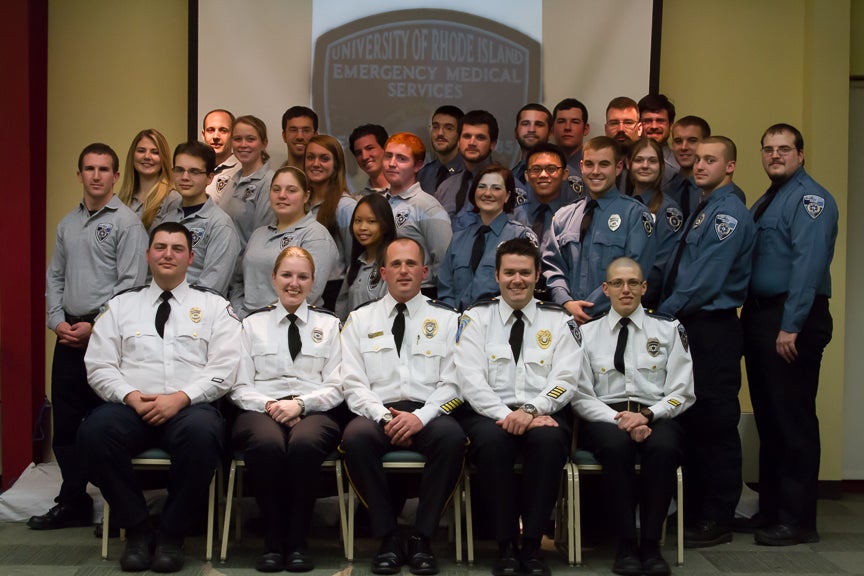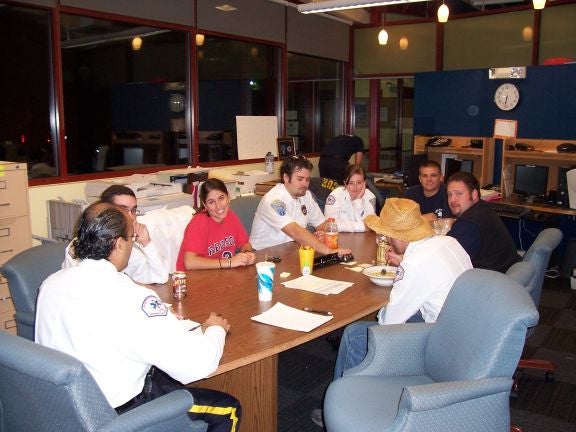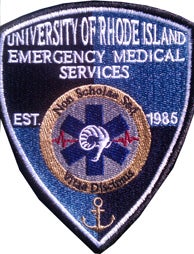
Based on the service provided since the 1970s, URI EMS is a quasi-independent volunteer nonprofit organization composed of approximately 100 students, faculty/staff and community members from across the state and beyond at any given time. URI EMS receives funding from and operates as a service of the University of Rhode Island.
We service the Kingston and Narragansett Bay Campus for emergencies and provide limited service upon request to the Providence and W. Alton Jones campuses. Due to distance, these campuses are serviced by their local municipal EMS departments for emergencies.
 As of Academic Year 2006-2007 (June 2006-May2007), we responded to over 950 requests for medical assistance and approximately 250 special events details. See Medical Records for more statistics.
As of Academic Year 2006-2007 (June 2006-May2007), we responded to over 950 requests for medical assistance and approximately 250 special events details. See Medical Records for more statistics.
URI EMS is one of a handful of non-municipal (town or city-based) EMS agencies in the state that respond to “9-1-1 emergencies”. Primary EMS response services are the sole responsibility of URI EMS, though an extensive two-way mutual aid system is in place to connect with other Town/City services as needed.
We currently operate one transporting rescue 24/7/365. We are a non-profit organization with an all-volunteer response capacity. We are one of the last “true” volunteer services and staff a minimum of two people on an ambulance at the station ready to respond at all times without any monetary or other compensatory incentive. By having staff standby at Headquarters, our response times are among the best for volunteer departments and one of the quickest in the state (approximately 2-3 minutes from the time of dispatch to arrival on the scene of the emergency). Our personnel save the University well over $500,000 each year while donating medical services equivalent to well over $300,000.
 URI EMS provides a range of services for the University of Rhode Island and the surrounding communities. Our emergency response and transport services are free of charge to students of the University. We also provide a range of other services to the community, from educational services to emergency readiness assessments to special operations services and courses in other topics.
URI EMS provides a range of services for the University of Rhode Island and the surrounding communities. Our emergency response and transport services are free of charge to students of the University. We also provide a range of other services to the community, from educational services to emergency readiness assessments to special operations services and courses in other topics.
Our staff is dedicated to providing the highest quality of prehospital emergency medicine in the most effective manner possible. We train continually on the latest methods and practices using modern delivery techniques to ensure quality services.
In addition, we have high standards in quality assurance. Reports are reviewed regularly by senior staff and our Medical Director. All supervisors meet regularly to discuss concerns and to resolve important issues as they arise.
General Information
The following additional sections provide more information about our organization, what we do and how we do it.
- History
- Operations
- Special Operations
- Training
- Medical Records
- Apparatus
- Headquarters
- Organization Chart
Make a Difference!
Become a volunteer (no experience required-we provide your training). Only six hours per week and one meeting per month are required. Check out “Become a Volunteer” in the navigation menu for more information
No time to volunteer? If time is short, consider making a donation. See the “Support/Donate” section for more information. Your support is greatly appreciated.
Statistics
*Stats for the past two years are approximate and not definite. URI EMS is undergoing a change to a new reporting form and numbers depited may be lower than actual*
Click the graph for a larger image.
 URI Homepage
URI Homepage









